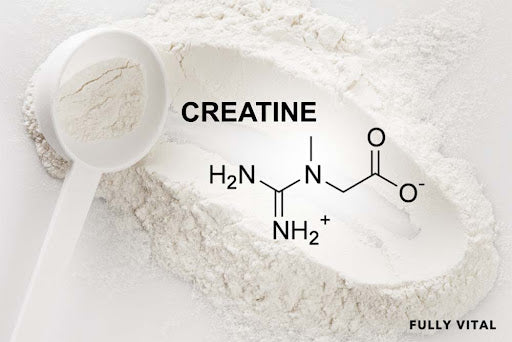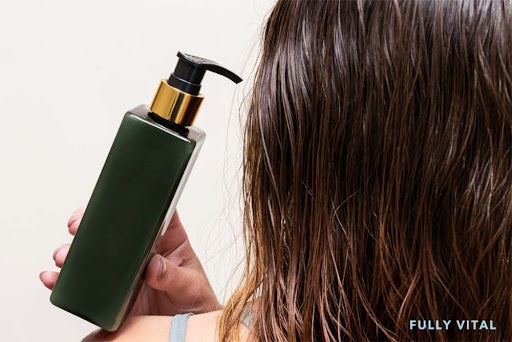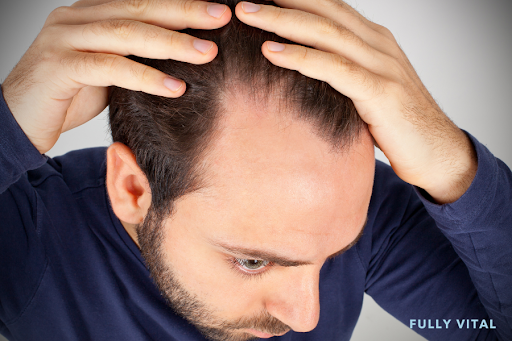
Creatine And Hair Loss: Separating Fact From Fiction
Creatine is a widely used supplement in the fitness and athletic community, known for its potential benefits in improving exercise performance and building muscle mass.
However, there have been concerns and questions about the possible relationship between creatine supplementation and hair loss.
In this article, we will delve into the scientific evidence surrounding creatine and its impact on hair health.
By separating fact from fiction, we aim to provide a clear understanding of the potential effects of creatine on hair loss and debunk any myths associated with it.

I LOVE MY HAIR NOW
FullyVital hair serum and hair vitamins made tremendous improvements in my hair. I truly love my hair now.
Dorit S.,
Creatine: Does It Promote Or Prevent Hair Loss?
Many people wonder if creatine can either promote or prevent hair loss.
The truth is that there is limited scientific evidence directly linking creatine supplementation to hair loss.
While some anecdotal reports suggest a possible connection, more research is needed to establish a definitive link between creatine and hair loss.1
Debunking Myths About Creatine And Hair Health
There are various myths surrounding creatine and its impact on hair health. Let's separate fact from fiction by debunking these common misconceptions:
Myth: Creatine directly causes hair loss.
Fact: Currently, there is no scientific evidence proving a direct causal relationship between creatine and hair loss.
Myth: Creatine leads to premature baldness.
Fact: Premature baldness is primarily influenced by genetics, not by creatine supplementation.
Myth: Creatine affects hormone levels, leading to hair loss.
Fact: Studies have not found a significant impact of creatine on hormone levels that could directly cause hair loss.

Potential Impact Of Creatine On Your Hair
While there is insufficient evidence to support a direct link between creatine and hair loss, there are a few potential factors worth considering:
Dehydration
Creatine can cause water retention, leading to temporary weight gain.
However, if not properly hydrated, this may affect the health of your hair, which relies on hydration for optimal growth.
Ensure you drink enough water while using creatine supplements.2
Diet and Nutrition
Creatine supplementation may indirectly impact your hair by affecting your overall diet and nutrition.
It is crucial to maintain a balanced and nutrient-rich diet to support healthy hair growth.
Creatine Use: Is Hair Loss A Side Effect?
Hair loss is not commonly reported as a side effect of creatine use.While some individuals claim to have experienced hair loss while using creatine, it is essential to consider other factors that could contribute to hair loss, such as genetics, stress, hormonal changes, or underlying health conditions.3
It's important to consult with a healthcare professional or a dermatologist if you have concerns about hair loss while using creatine or any other supplement.
The Role Of Scientific Progress And Ongoing Research
- Advancements in Research Techniques: Over time, advancements in research techniques have allowed for more comprehensive investigations into the effects of supplementation on hair health. These advancements may shed new light on the relationship between creatine and hair loss and help determine whether there is a genuine causal link.
- Ongoing Research Efforts: Ongoing studies and research efforts in the field aim to expand our understanding of the potential impact of creatine on hair loss. By monitoring these developments, Hair Growth Product Companies can stay informed about the latest findings and update their knowledge and recommendations accordingly.
- Further Investigation Needed: The history of the debate on creatine and hair loss emphasizes the need for further investigation. Continued scientific research will provide more conclusive evidence regarding the potential causes and effects of creatine on hair health, offering valuable insights for the Hair Growth Product Company to tailor their products and recommendations.
What Is the Relationship Between Creatine And Hair Loss?
The relationship between creatine and hair loss has been a subject of concern among individuals, especially those engaged in regular workout routines and fitness enthusiasts.
Creatine is a popular dietary supplement used to enhance athletic performance, and some have raised questions about its potential connection to hair loss.
While there is no conclusive evidence to suggest that creatine directly causes hair loss, there are some factors to consider.
It's important to understand how creatine may affect hair loss to make informed decisions about its usage.
How Does Creatine Affect Hair Loss?
Creatine itself does not directly lead to hair loss.
However, its potential influence on hair loss is linked to its impact on dihydrotestosterone (DHT), a hormone associated with hair loss in individuals genetically predisposed to androgenic alopecia.
Some studies suggest that creatine can elevate DHT levels in the body, potentially accelerating hair loss in those who are already genetically susceptible. To mitigate this risk, individuals concerned about hair loss may opt for creatine supplements that are DHT-free or explore alternative performance-enhancing options.
Additionally, maintaining a balanced diet and consulting with a healthcare professional can help address any potential concerns related to creatine and hair loss.
The Benefits Of Understanding The Creatine And Hair Loss Connection
Understanding the potential effects of creatine on hair loss has several benefits:
- Informed Decision Making: By knowing the facts, individuals can make informed decisions about using creatine supplements and how it may affect their hair health.
- Appropriate Hair Care: If using creatine supplements, individuals can take necessary precautions to maintain hair health through proper hydration and nutrition.
- Reduced Anxiety: By debunking myths and understanding the limited evidence, individuals can alleviate anxiety or concerns related to hair loss possibly caused by creatine.
What Are The Potential Downsides Of Creatine In Hair Loss?
While there is limited scientific evidence directly linking creatine to hair loss, it is essential to acknowledge potential downsides or considerations:
Association vs. Causation
Anecdotal reports suggesting hair loss while using creatine may be coincidental or influenced by other factors.
Indirect Effects
Creatine's impact on water retention and overall nutrition may indirectly affect hair health, highlighting the importance of proper hydration and a balanced diet.

Discover Fuller, Healthier Hair With Fully VitalIs your hair losing its vitality? We have the solution you need! At Fully Vital, we understand that your hair represents your inner strength and beauty. Key Features:
Benefits:
You deserve to have a thriving relationship with your hair. Begin your journey to a more vibrant, healthier hair lifestyle today with Fully Vital products. Say 'No' to hair aging and 'Yes' to embracing your hair’s full potential! ACT NOW! Take control of your hair's future today. Choose Fully Vital to rewrite your hair story. Start your hair rejuvenation journey now. Grab our scientifically-backed hair growth products today! |
Final Thoughts On Does Creatine Cause Hair Loss
In conclusion, the question of whether creatine causes hair loss is a topic of debate with limited scientific evidence to support a direct link.
While anecdotal reports exist, it is essential to consider other factors that may contribute to hair loss, such as genetics and overall health.
Maintaining proper hydration, nutrition, and overall hair care are significant factors in promoting healthy hair growth.
At Fully Vital, we understand the importance of maintaining a healthy relationship with your locks.
Our hair growth products are designed to address the effects of aging on your hair, helping you achieve healthier and more vibrant hair.
Remember, if you have any concerns about hair loss or potential side effects from creatine use, it is always advisable to consult with a healthcare professional or a dermatologist for personalized guidance.
Take a step towards healthier hair today, and explore Fully Vital's range of hair growth products for a renewed sense of confidence and vitality.
Frequently Asked Questions On Does Creatine Cause Hair Loss
What research exists on creatine and hair loss?
While there is limited scientific evidence directly linking creatine supplementation to hair loss, it's important to mention the existing research on this topic. Here are key points to consider:
- Study Limitations: The current research on creatine and hair loss is limited, with small sample sizes and varying methodologies.
- Anecdotal Reports: Many reports of hair loss related to creatine use are based on personal experiences, which cannot be considered as concrete scientific evidence.
- Further Investigation: More extensive research is needed to establish a definitive link between creatine and hair loss.
Can hair loss from creatine be reversed?
Hair loss attributed to creatine use may or may not be reversible. The reversibility depends on various factors, including:
- Underlying Cause: Identifying the root cause of hair loss is crucial. If creatine use is determined to be the direct cause, discontinuing its use may result in potential hair regrowth.
- Individual Differences: Hair loss and regrowth vary among individuals. Some may experience improvement once creatine use is stopped, while others may require additional interventions or time for hair to recover fully.
Is creatine-induced hair loss permanent?
The permanence of creatine-induced hair loss is uncertain.
As mentioned earlier, if creatine use is the direct cause of hair loss, discontinuation may lead to potential regrowth.
However, individual responses may differ, and some cases of hair loss may be unrelated to creatine altogether.
Why do people believe creatine causes hair loss?
There are several reasons why some individuals believe creatine causes hair loss:
- Anecdotal Reports: Many people rely on anecdotal reports from others who claim to have experienced hair loss while using creatine. Such reports can contribute to the belief despite the lack of scientific evidence.
- Association Bias: The timing of hair loss coinciding with creatine use may create a perceived association. However, other factors such as genetics, stress, or hormonal changes could be the actual cause.
Does creatine affect DHT levels?
Dihydrotestosterone (DHT) is a hormone associated with hair loss.
While there is limited research specifically studying the effect of creatine on DHT levels, some studies suggest that creatine supplementation might modestly increase DHT.
However, it is unclear whether this increase is sufficient to cause hair loss.
How does creatine affect testosterone levels?
Creatine has been shown to potentially increase testosterone levels.
However, the extent to which this impacts hair health is uncertain.
Higher testosterone levels can be associated with increased risk of hair loss in individuals already predisposed to it due to genetics or hormonal sensitivity.
Is there a safe dosage of creatine to prevent hair loss?
While there is no specific dosage that can entirely prevent hair shedding associated with creatine use, adjusting dosage levels and maintaining proper hydration can help minimize the potential impact on hair health.
It is crucial to consult with a healthcare professional or a nutritionist to determine the appropriate creatine dosage based on individual needs and circumstances.
Are certain individuals more susceptible to hair loss from creatine?
Hair loss susceptibility varies among individuals.
While some people may experience temporary hair shedding due to factors associated with creatine use, others may not be affected at all.
Factors such as genetic predisposition, hormonal sensitivity, and overall hair health may contribute to differing responses to creatine and its potential impact on hair.
Sources:
- Juhn, M. S. (2003). Popular Sports Supplements and Ergogenic Aids. Sports Medicine, 33(12), 921–939. https://doi.org/10.2165/00007256-200333120-00004
- Juhn, M. S., & Tarnopolsky, M. (1998). Potential Side Effects of Oral Creatine Supplementation: A Critical Review. Clinical Journal of Sport Medicine, 8(4), 298. https://journals.lww.com/cjsportsmed/Abstract/1998/10000/Potential_Side_Effects_of_Oral_Creatine.7.aspx
- Antonio, J., Candow, D. G., Forbes, S. C., Gualano, B., Jagim, A. R., Kreider, R. B., Rawson, E. S., Smith-Ryan, A. E., VanDusseldorp, T. A., Willoughby, D. S., & Ziegenfuss, T. N. (2021). Common Questions and Misconceptions about Creatine supplementation: What Does the Scientific Evidence Really show? Journal of the International Society of Sports Nutrition, 18(1). https://doi.org/10.1186/s12970-021-00412-w







